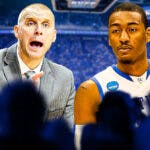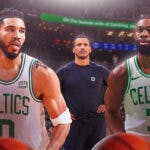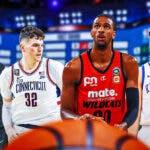When John Wall entered the NBA with the Washington Wizards back in 2010, expectations were sky high.
He was the No. 1 overall pick of the draft and was considered one of the best point guard prospects we had seen in quite some time (along with Derrick Rose in 2008).
He was blindingly fast. He was freakishly athletic. His handles were top notch. He could pass. He could defend.
Outside of his questionable perimeter shot, there wasn't much not to like about Wall.
The University of Kentucky product went on to have an impressive rookie campaign, averaging 16.4 points, 8.3 assists, 4.6 rebounds and 1.8 steals per game. Yes, his efficiency left much to be desired, but those were some really eye-opening numbers for a first-year player.
It just made all of the hype surrounding Wall even more palpable. Just imagine how much better he could get?
Well, here we are, a decade later, and Wall is not what many people thought he would be.
Even before the injuries, Wall had drawn heavy criticism for failing to expand upon his game, as the same flaws that existed during his rookie season (e.g. not having a good jump shot) still exist today.
There was a brief moment in 2017 when Wall was considered one of the very best point guards in basketball, when he led the Wizards to 49 wins and ultimately fell to Isaiah Thomas and the Boston Celtics in a thrilling seven-game second-round playoff series.
But during that series, Wall's lack of an outside shot was on full display, as was his tendency to fade down the stretch of games.
Since then, Wall's reputation has fallen quite a bit, which obviously has a lot to do with the fact that he played just 41 games the following season and then 32 last year before suffering a torn Achilles. He has not played at all this season.
But even before the injuries set in, the critics began to get on Wall's case. It was becoming increasingly apparent during the 2017-18 campaign (one year after the best season of Wall's career) that Wall's teammates weren't particularly fond of him. Heck, when Wall was out with injuries that season, Washington actually had some success, which led some to ponder if the Wizards were actually better off without Wall (which was silly).
While some of the backlash that Wall has encountered over the years has been unfounded, not all of it is completely wrong.
Wall is a lifetime 32.4 percent 3-point shooter. He owns an ugly career true shooting percentage of 51.9 percent. As far as Win Shares per 48 minutes? He is barely above the approximate league average of .100 at .104.
Oh, and in 37 career playoff games? Wall has made just 41.9 percent of his shots and 26.7 percent of his triples.
The fact that the Wizards proceeded to get bounced in the first round in 2018 one year after what many thought was a breakthrough season for them didn't exactly help Wall's case.
So, clearly, some of the criticism is warranted. Wall has still not improved upon his problem areas, which has made him a whole lot more guardable than he should be. Just picture how dominant Wall would be if teams seriously had to respect his perimeter shot. He would be blowing by defenders with regularity.
Instead, defenders can sag off Wall, daring him to shoot jumpers, Rajon Rondo style. It's not exactly a death blow for Wall, as he has still managed to be a very good player in spite of that key deficiency. But it's a problem that has limited his own ceiling and the Wizards' ceiling.
To be fair to Wall, a big part of the reason why he has not been able to find much success is because Washington simply has not put a good enough team around him. Sure, he has had Bradley Beal, but otherwise, the Wizards have been pretty limited.
Still, the holes in Wall's game are obvious, and it's also pretty clear that he either a.) has not worked hard enough to rectify them, or b.) can't get any better in those areas regardless of how much he tries.
Either way, outside of that one short stretch in 2017, Wall has never been considered a truly elite player, and now that his torn Achilles will likely sap a decent amount of his explosiveness, it's difficult to ever envision him reaching that point from here on out.




